The official story is this:
Julian Francis Detmer founded Detmer Woolen Company in New York City in 1885, first as an importer of fine woolen fabrics, and then as producer, selling exceptional textiles to fine tailors across the United States until he retired in 1933 (or 1935) and sold the company, dedicating his later years to tree conservation. It’s a decent story. Succinct. But there's a lot more to this glossy story.
Julian Detmer, the Legend
According to the 1938 interview by world-renowned author Dale Carnegie (of How to Win Friends and Influence People fame), Detmer was one of the most enthusiastic, joyful people Carnegie had ever met, especially since Detmer dedicated almost half a century surrounded by the most exquisite garden anyone with his wealth could create. Or if you read Maureen McKernan’s 1932 article, Julian was “plain crazy” when he proclaimed at age 17, “the customer is always right” - an alien concept that baffled for the world of woolen goods and textiles, until it lead him to a world-wide success.
Need somewhere to hang your custom tailored coat?
The later-in-life coloring of one’s history is common for persons of means, but is was especially important in the 1930s post-Prohibition, when so many “less than savory” men had made fortunes bootlegging. The hard-work, “pull yourself up by the bootstraps” narrative is preferable, and less complex. Even McKarnan’s tale of a young Julian running away to be an actor and - due to the financial failure of the troupe - forced to reconsider gainful employment in the respectable world of woolen goods, is a tale of security in the establishment.
The history of Julian Francis is a pretty remarkable story, and it all begins with his grandfather.
Grandfather Gerhart
Gerhart Heinrich Detmer, born in Germany 1798. The Detmer’s family moved to the United States around 1805, settling in Baltimore, Maryland. Over the next 15 years, young Gerhart grew up and learned tailoring, opening up his own business (H Detmer and Company) in 1819 at 21 years old. When the family moved to Cleveland, Ohio, they found themselves in the midst of a welcoming German community, including the Kleine family. Gerhart met Anna Marie Beckman, and married in 1835. Gernhart and Anna Marie had 13 children, but in 1837 they had Gerhard Heinrich Detmer Jr. known as “Henry.”
After his education, Henry followed in his father’s footsteps, expanding to be a wholesale importer of textiles including wools and silks. it was in 1858 when Henry married his business partner’s daughter, Josephine. It’s how we have the company Kleine, Detmer, and Company, and explains why Joseph Kleine listed his occupation as a “Merchant Sailor” in the 1850s census records, to “Merchant Importer” in the 1860s. Henry also became quite involved with local and state politics as a strong Democrat with a voice for his community. It was December 4, 1865 - the same year the American Civil War ended - that Henry and Josephine welcomed Julian Francis Detmer - the bright star of this story that burned for almost 93 years on this planet.
If you're not fancy enough for tailored shirts, we've got you covered
Like his father, Julian completed his schooling. Whether he ran away to join a minstrel show that failed, or not, there are a few missing years between his 18th birthday and 1885, the year when he decided to learn the family business of Detmer and Moore (later Detmer and Richter). Julian was less interested in learning about tailoring and sewing, and more interested in textiles, fabrics, and trimming. In 1888, he decided to branch full time into Detmer Woolen Company in Columbus, Ohio in an effort to supply fabrics, trimmings, and accessories to other tailors besides those of his own immediate family.
Detmer's Tailor Revolution
The tailoring business had not quite kept up with the modern advancements of other businesses. The family business was just for the family. Julian’s business model was more universal, freeing up local tailors from hunting for fabrics and patterns so they can spend more time with their clients and making clothes. It also allowed tailors to buy only the material they needed without the need to stock bolts of fabric that were only used once. It revolutionized the industry, and allowed tailors to work in smaller, less expensive spaces with more efficiency and reduced waste.
Shouldn't you be displaying your custom suits in this?
Nationwide Expansion
It worked really well. In 1890, Julian Detmer moved his business to Chicago, and much of his family went with him to help. From 205 W. Monroe Street, the Detmers helped run the company and opened up wholesale houses across the United States with his brothers (and possibly a sister) as directors:
Though Julian started working in the family business in 1885, and migrated to his own Detmer Woolen Company in 1888, it wasn’t until October 4, 1906 that the company was officially incorporated in Kansas City, Missouri - a centralized location to ship to across the United States. When Julian moved his wife and children to Greenburgh, New York, his brother Martin J. Detmer took over Chicago operations and functioned as Vice-President and director. Julian's name was on everything, everywhere, yet he stayed in New York or Florida - conducting the massive business ran mostly by his siblings.
Check out this antique sign for midwest tuxedos
But that didn't mean there weren't problems. Tailors were complaining of being short-changed, others complained about aggressive business practices. If a tailor failed to pay, Detmer would absorb their business.
(Detmer Woolen Co. v. Van Horn, 110 N.Y.S. 312; Hesselbrock v. Detmer Woolen Co., 205 A.D. 869) In 1915, the U.S. Government won a case against Detmer Woolen for the company lying about their import values.
The Famous Sample Boxes
But throughout the early 1900s, Detmer Woolen made life easier for tailors, providing them with access to the largest collection of fabrics, window displays, advertising, easy to order operations, and one of the most beautiful and captivating swatch sample boxes created.
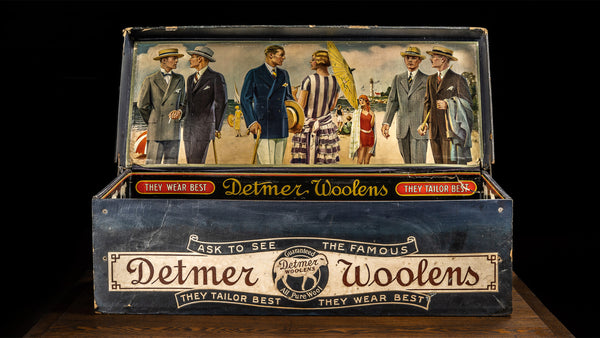
We can help sell your antique furniture and advertising
The Parker Bldg Fire
In January 1908, the Parker Building in New York caught fire. Just a few years earlier it was hailed as the most fire-resistant skyscraper (newly coin-ed word) ever built.. Papers were published about its construction. Not only did it go up in flames quickly, unsubstantiated rumors were circulating that the fire started on the 6th floor occupied by Detmer Woolens. Now the government was talking about new building codes and prying into his business as a work hazard, even as he moved his New York base to Brooklyn.
Detmer Woolen Dissolves
As the 1920s arrived, Julian started to shift things around in his life to center his life around his growing lifestyle and less around textile imports and distribution. He had made his new home in Tarrytown an oasis; importing trees, setting up greenhouses, and establishing an ever growing garden. As he was the talk of Westchester County, New York, he was often seen entertaining legislatures and city councilmen. In 1922, he simultaneously dissolved Detmer Woolen Company and opened Detmer Securities Corp with $1 million in stocks and bonds with his children as board members. The assets of Detmer Woolen were grouped with other companies in the industry - Bruner Woolen Company, Mason & Hanson, Inc., and Salzer & Wolf, Inc. - combined to create Detmer, Bruner & Mason, Inc.
2 years later, in 1924, Julian’s wife and mother to his 3 kids, Esther Marie, died. Julian has been working less with the company, and spending more time with personal pursuits. When the Breakers Hotel in Palm Beach, Florida reopened after their 1925 fire, Detmer was one of the first businessmen there with his yacht “Florance,” claimed to be the “largest twin screw gasoline propelled yacht on the water," originally crafted in 1914 by George Lawley & Son (est. 1866) of Neponset, Massachusetts. Since being built by Standard Oil co-founder, Henry Flagler, The Breakers had been the place of congregation for powerful tycoons, celebrities, and politicians across the world.
Overactive Retirement
By the time Julian was a chairman for the newly-formed Washington Irving Trust Company (1928, based out of Tarrytown, New York), he had become part of the Larchmont Yacht Club, Columbia Yacht Club, Tarrytown Boat Club, the exclusive New York Athletic Club (via Travers Island, New York), the Army Navy Club, League for Political Education (with Presbyterian minister Robert Erskine Ely as director), American Criterion Society (est. 1912 by Hattie Hill), Automobile Association of America, New York Botanical Gardens, New York Zoological Society, and various other chambers of commerce and country clubs from Westchester, New York to Columbus, Ohio.
Businessmen Doing Business Things
1933 is when the attorneys for Detmer, Bruner & Mason, Inc. changed the company name to D-B-M Corp., even as salesmen were still using old Detmer Woolen advertising, order cards, and trademarks to court customers in certain territories, like Chicago. (Wawak Co. v. Kaiser, 90 F.2d 694 is a fascinating court case and was used to verify many of the dates used in this article). It wasn’t the most atrocious thing going on in the country; 1933 was the same year Major General Smedley Darlington Butler (the “Maverick Marine”) was being tasked by prominent American businessmen and Wall Street executives - the same businessmen and executives Detmer was yachting with and opening up side businesses with - to overthrow the government by force and replace Franklin Delano Roosevelt with trusted veteran Maj. General Butler as president.
1933 is also the same year John Irving Walsh, the ex husband of Julian’s new wife, Marie L Bungay, dies. Marie, perhaps wooed by Maureen McKernan’s 1932 glowing article of Julian Detmer’s gumption and gravitas in the world of textiles and woolen imports, was quick to marry Detmer, but their marriage didn’t even last a year. In 1934, two months before Smedley Butler went public about the Business Plot (also called the” Wall Street Putsch” and “The White House Putsch”), Marie drove to Reno from New York to get a divorce.
It's understandable that all this noise found Detmer spending more time with his garden and less time in the City with his businesses, until he finally officially retires shortly after this loud series of events. Detmer, Bruner & Mason, Inc. OR D-B-M Corp didn't last long. By 1934, the remains of the company was absorbed into Ferris Woolen Company (Chicago), who returned to the beautiful sample boxes.
See fellow-Chicago tailor Fairbanks Custom Clothes' suitcase
But this framework puts self-help author Dale Carnegie’s series of jovial tales starting in 1938 saturating thousands of papers across the United States in perspective. But it also demonstrates how retrospective coloring can leave out the rich, wild, and varied a story of success can be. In no iteration of the Detmer Woolens Company online is there a story of siblings coming together in a family business creating a Chicago-based behemoth that spanned over 20 cites in 3 countries, to cater to tens of thousands of tailors every day. There’s no mention of how Julian’s model revolutionized the tailoring industry and dragged it into the modern age. Both of these are wildly important details lost in the gloss.
Julian Detmer, the Legacy
In the 1940s and 50s, Detmer spent as much time as he could at his Tarrytown estate. He had established Detmer Nurseries, had a team of several dozen gardeners and caretakers keeping up the property. His grandchildren got married on the grounds. His great grandchildren visited often. Most of his family who helped Julian establish Detmer Woolens stayed in Chicago or moved back to Ohio when he initially dissolved the company in 1922, but their children and grandchildren visited the gardens. Julian’s yacht, “Florence,” was sold to the U.S. Navy in 1942. The renamed it “IOLITE” and used it to test underwater communications with submarines.
Julian Detmer passed away November 26, 1958 - about a week before his December 4th birthday - at the age of 92 after living a rather large, varied, complicated, ingenious, sometimes suspicious, but always busy and inventive life that’s sadly gone mostly untold.



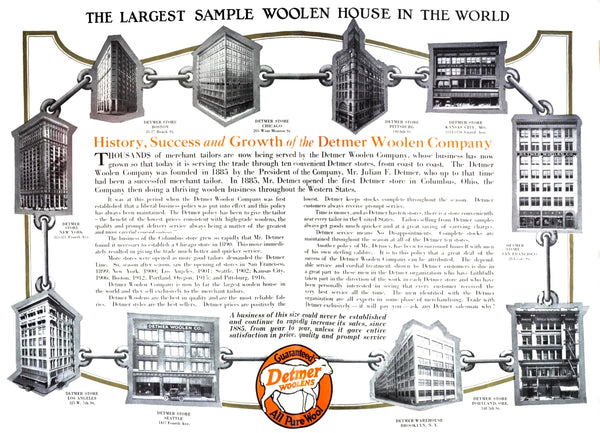
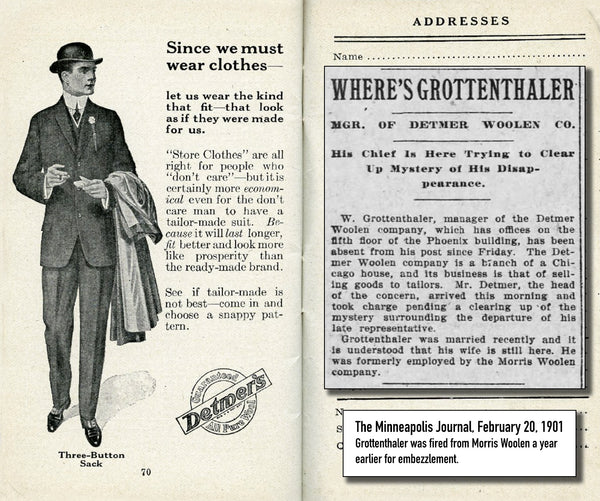
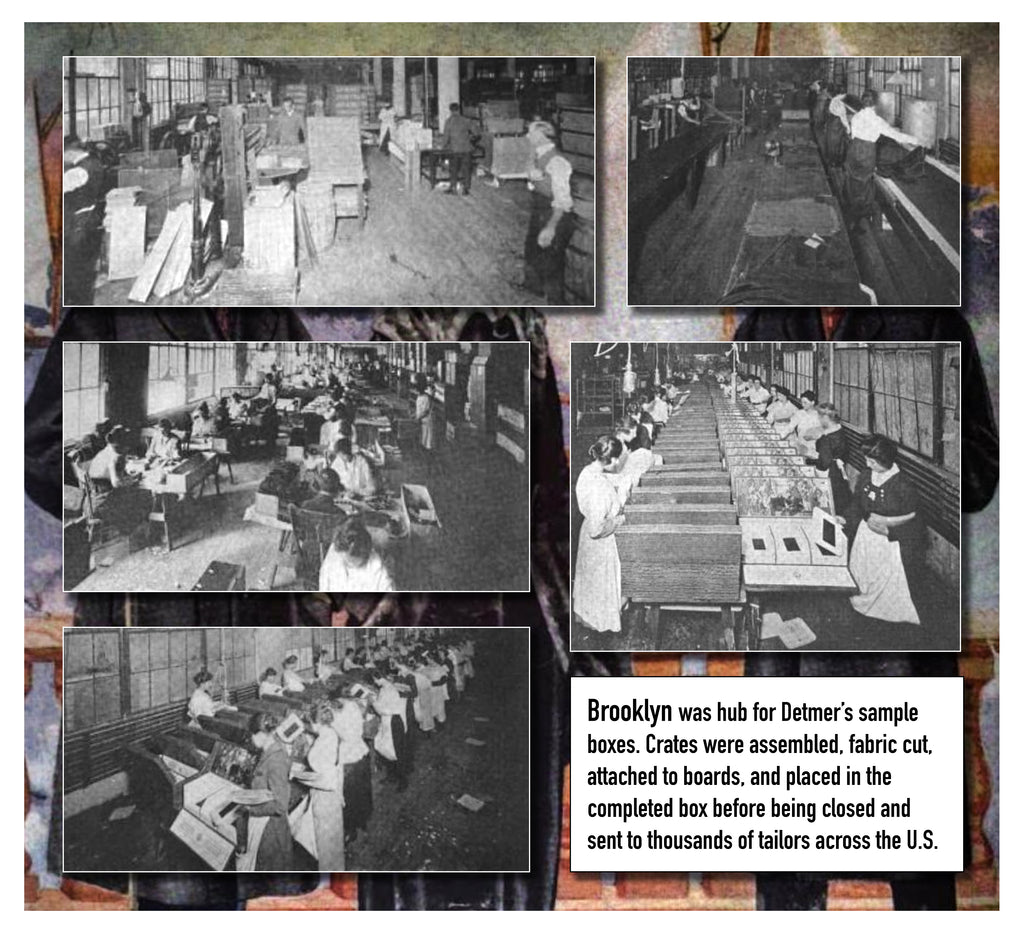
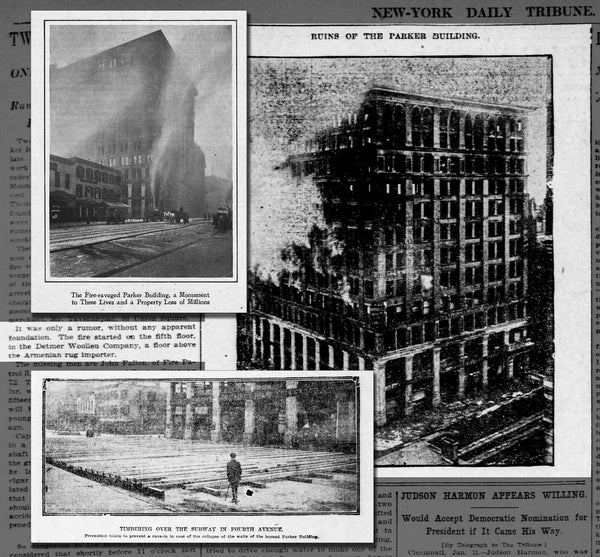

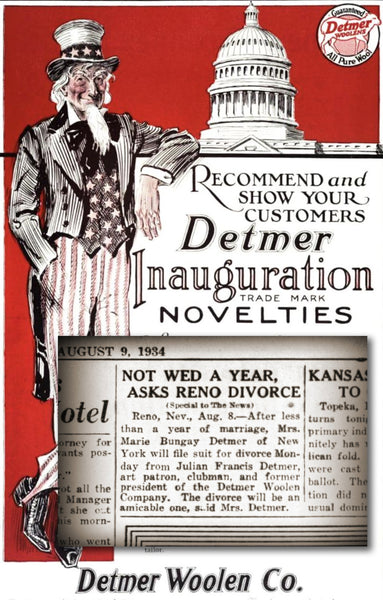
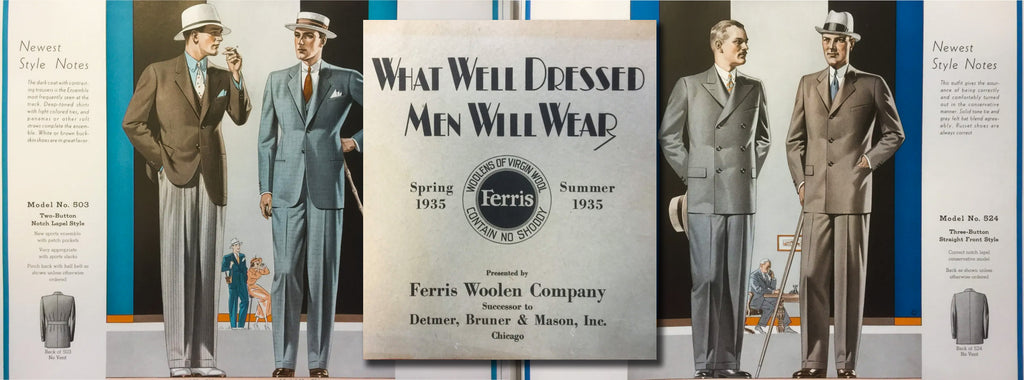
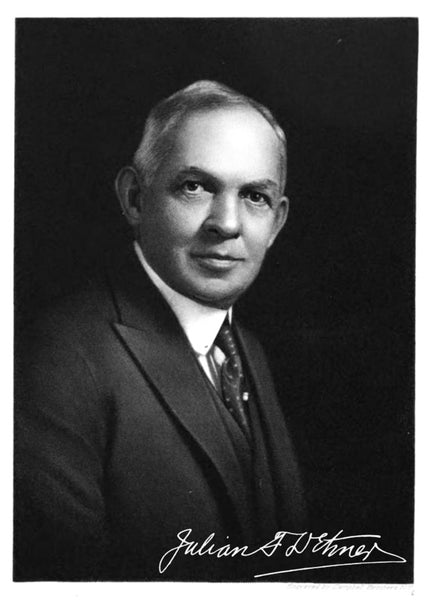



happy to read about my great-great grandfather’s legacy!
Leave a comment